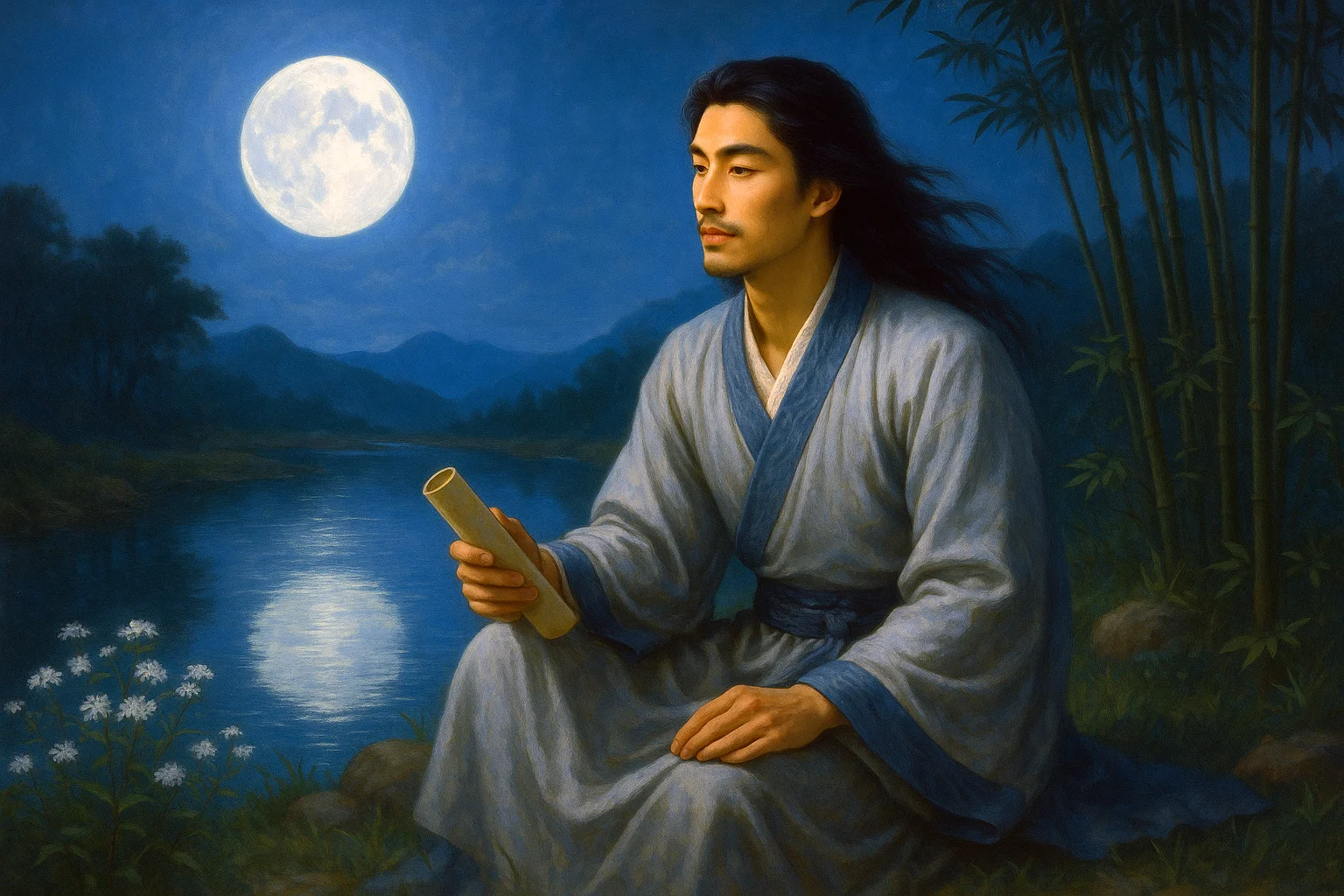River wears quicksilver clarity,
Moon-wind composes its own austerity.
My friend's shadow stretches a thousand miles,
This winecup grows heavy with exile's trials.
Born lazy and clumsy—who'd pretend
My circle wasn't doomed to end?
Vermilion strings gather sonatas of dust,
Where's the listener for my antiphonal rust?
Original Poem
「江上怀介甫」
曾巩
江上信清华,月风亦萧洒。
故人在千里,樽酒难独把。
由来懒拙甚,岂免交游寡。
朱弦任尘埃,谁是知音者。
Interpretation
Composed during Zeng Gong's provincial service in mid-Northern Song, this poem addresses his lifelong friend Wang Anshi (courtesy name Jiefu)—fellow reformist and intellectual ally. Though their political paths occasionally diverged, their mutual respect remained unwavering. Written when Wang served in the capital during turbulent reforms, the work transforms riverscape into a meditation on friendship's constancy amidst change. Its emotional authenticity and philosophical depth exemplify Zeng's ability to weave personal sentiment with universal resonance.
First Couplet: "江上信清华,月风亦萧洒。"
Jiāng shàng xìn qīng huá, yuè fēng yì xiāo sǎ.
The river's clarity proves truer than jade; / moonlit winds move with unstudied grace.
The adverb "truer than" (信) performs epistemological work—asserting nature's reliability against human fickleness. "Unstudied grace" (萧洒) characterizes the wind's effortless elegance, subtly contrasting with the poet's forthcoming confession of social awkwardness.
Second Couplet: "故人在千里,樽酒难独把。"
Gùrén zài qiān lǐ, zūn jiǔ nán dú bǎ.
My old friend counts a thousand miles away; / this winecup weighs heavy in my sway.
The tangible "heaviness" of the cup (樽酒难把) materializes emotional absence. The couplet's spatial tension—between the friend's abstracted distance and the cup's intimate weight—embodies Confucian fellowship's paradox: intellectual proximity across physical separation.
Third Couplet: "由来懒拙甚,岂免交游寡。"
Yóu lái lǎn zhuō shèn, qǐ miǎn jiāoyóu guǎ.
By nature I'm indolent, unpolished— / small wonder my circle stays unfurnished.
Zeng's self-deprecation ("indolent, unpolished") masks a fiercer pride. The admission of few friends (交游寡) becomes backhanded praise for their quality—implying most social bonds lack the substance he and Wang share.
Fourth Couplet: "朱弦任尘埃,谁是知音者。"
Zhū xián rèn chén āi, shuí shì zhīyīn zhě.
Crimson lute-strings gather dust untended— / where's the connoisseur who'd comprehend it?
The dust-choked lute (朱弦) symbolizes neglected talents awaiting perfect resonance. "Connoisseur" (知音者) invokes the legendary musician Boya and his ideal listener Zhong Ziqi—a metaphor for political and artistic recognition. The rhetorical question hangs like the dust motes themselves—unanswered yet luminous.
Holistic Appreciation
This poem begins with a riverscape scene that serves as a prelude to the poet's profound longing for his distant friend Wang Anshi. Despite the beautiful scenery and fine wine before him, the poet feels a deep loneliness in the absence of a kindred spirit to share the moment. The middle couplets further reveal his limited social circle and introspective nature, while the concluding lines underscore the poem's central theme: how rare it is to find a true friend in life. The poem progresses methodically—from scenery to remembrance, then to self-reflection and philosophical musing—with plain yet sincere language that carries a gentle, contemplative wisdom. It exemplifies Zeng Gong's poetic style: refined yet clear-eyed, lyrical yet rational.
Artistic Merits
- Natural Prelude, Blended Scene and Emotion
The opening scene serves as a subtle trigger for emotion, making the transition from description to feeling seamless and organic. - Clear Progression, Layered Sentiment
The poem unfolds in four distinct stages: scenery → emotion → introspection → philosophy, creating a tight, logical structure. - Concise Language, Philosophy Through Feeling
Eschewing ornate embellishment, the poem conveys deep thought through plain speech, embodying the Song dynasty ideal of "simple words expressing profound truths."
Insights
This poem reminds us that true friendship transcends physical presence—it is a bond of understanding that persists across distances. In our noisy world, finding even one person who truly resonates with our soul is a rare blessing. The poet's yearning for a kindred spirit is also a quiet protest against loneliness. By likening unplayed zither strings to dust-covered connections, he highlights the scarcity of genuine intellectual harmony while urging us to cherish those few who truly comprehend us.
About the Poet

Zeng Gong (曾巩, 1019 - 1083), a native of Nanfeng in Jiangxi province, stands among the illustrious "Eight Great Masters of Tang-Song Prose." His writings distinguished themselves through an elegant classical balance, celebrated for their rigorous argumentation and refined literary craftsmanship. While his poetry embraced an artless subtlety, his prose achieved what critics hailed as "the very essence of purity" - an achievement that, though perhaps less dazzling than his contemporaries like Su Shi or Wang Anshi, earned him posthumous reverence as the founding master of the "Nanfeng Literary School."












